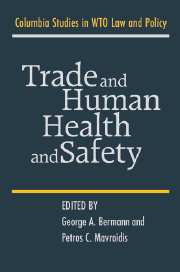Book contents
- Frontmatter
- Contents
- Preface to the Series
- Introductory Remarks
- 1 A Map of the World Trade Organization Law of Domestic Regulation of Goods
- 2 The WTO Impact on Internal Regulations: A Case Study of the Canada–EC Asbestos Dispute
- 3 Reflections on the Appellate Body Decision in the Hormones Case and the Meaning of the SPS Agreement
- 4 The Salmon Case: Evolution of Balancing Mechanisms for Non-Trade Values in WTO
- 5 Lotus Eaters: Reflections on the Varietals Dispute, the SPS Agreement and WTO Dispute Resolution
- 6 Regulatory Purpose and “Like Products” in Article III:4 of the GATT (with Additional Remarks on Article III:2)
- 7 The WTO Standard of Review in Health and Safety Disputes
- 8 Expert Advice in WTO Dispute Settlement
- 9 Domestic Regulation, Sovereignty and Scientific Evidence Requirements: A Pessimistic View
- 10 Time for a United Nations' “Global Compact” for Integrating Human Rights into the Law of Worldwide Organizations: Lessons from European Integration Law for Global Integration Law
- Index
3 - Reflections on the Appellate Body Decision in the Hormones Case and the Meaning of the SPS Agreement
Published online by Cambridge University Press: 27 July 2009
- Frontmatter
- Contents
- Preface to the Series
- Introductory Remarks
- 1 A Map of the World Trade Organization Law of Domestic Regulation of Goods
- 2 The WTO Impact on Internal Regulations: A Case Study of the Canada–EC Asbestos Dispute
- 3 Reflections on the Appellate Body Decision in the Hormones Case and the Meaning of the SPS Agreement
- 4 The Salmon Case: Evolution of Balancing Mechanisms for Non-Trade Values in WTO
- 5 Lotus Eaters: Reflections on the Varietals Dispute, the SPS Agreement and WTO Dispute Resolution
- 6 Regulatory Purpose and “Like Products” in Article III:4 of the GATT (with Additional Remarks on Article III:2)
- 7 The WTO Standard of Review in Health and Safety Disputes
- 8 Expert Advice in WTO Dispute Settlement
- 9 Domestic Regulation, Sovereignty and Scientific Evidence Requirements: A Pessimistic View
- 10 Time for a United Nations' “Global Compact” for Integrating Human Rights into the Law of Worldwide Organizations: Lessons from European Integration Law for Global Integration Law
- Index
Summary
One of the most important and controversial decisions of the WTO dispute settlement system in its early years was the so-called Hormones case, which involved claims by the United States and Canada that an EC ban on the sale and import of meat from cattle treated with growth hormones violated the WTO Agreement on the Application of Sanitary and Phytosanitary Measures (SPS Agreement). In this chapter, I examine a number of the key issues in that case in light of the Appellate Body report. In particular, I will consider its rulings on several preliminary issues – the questions of burden of proof, standard of review and the precautionary principle – and then turn to its interpretation of Articles 3 and 5 of the SPS Agreement. The chapter concludes with a few observations (i) on the SPS Agreement and the extent to which it constrains governments in adopting the SPS measures of their choice and (ii) on the judicial method of the Appellate Body.
Preliminary Issues
The Appellate Body dealt with three important preliminary issues before turning to the substantive meaning of the obligations of Article 3 and 5 of the SPS Agreement: the question of burden of proof, the standard that should be applied by a panel in reviewing government action under the SPS Agreement and the position of the so-called precautionary principle under the SPS Agreement.
- Type
- Chapter
- Information
- Trade and Human Health and Safety , pp. 118 - 132Publisher: Cambridge University PressPrint publication year: 2006
- 2
- Cited by



